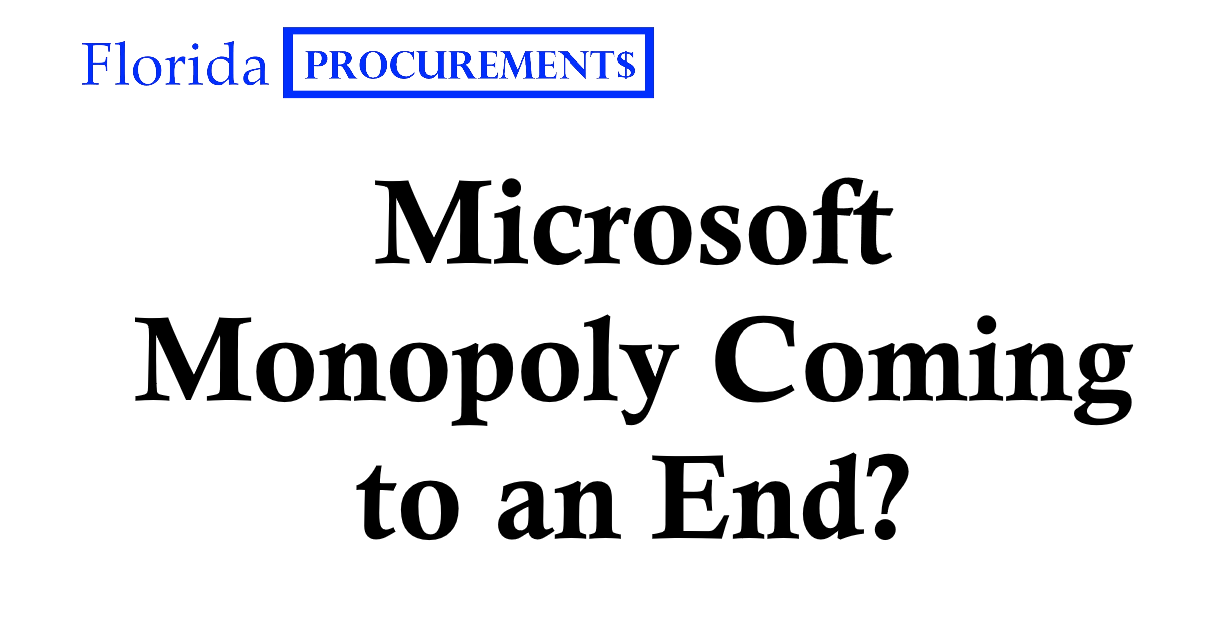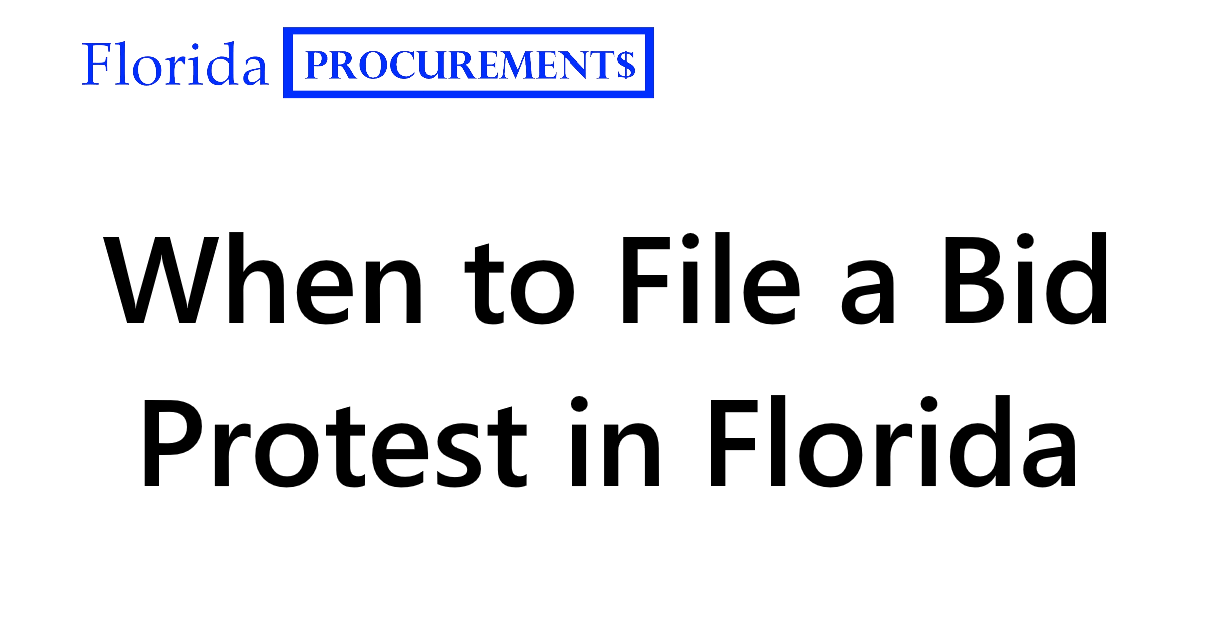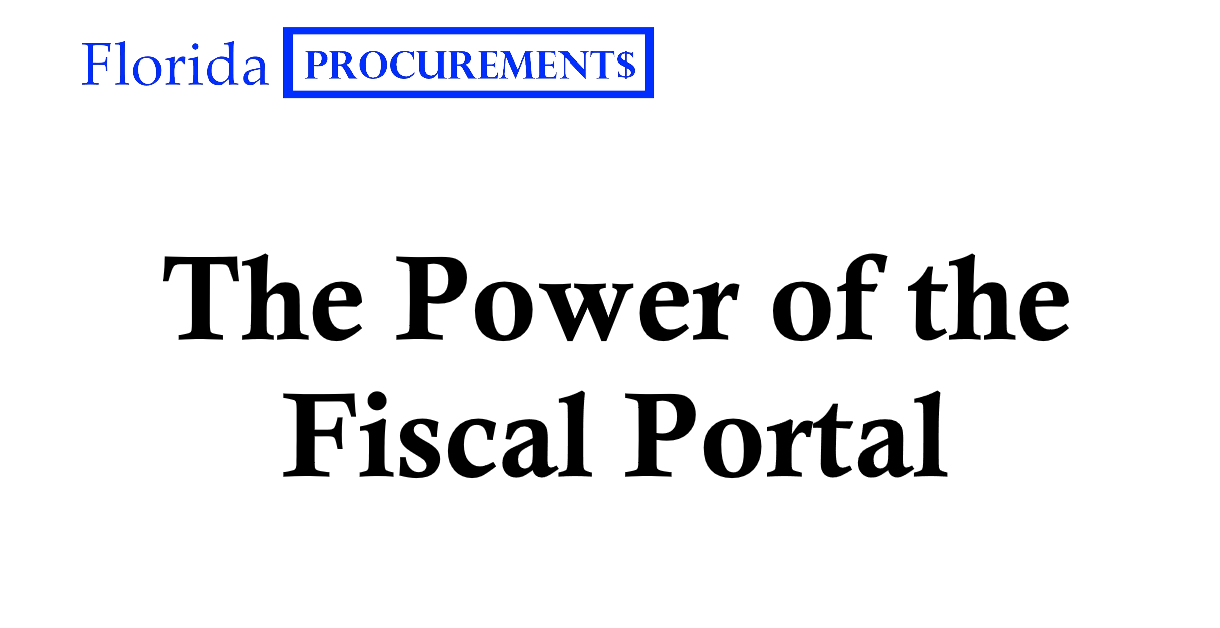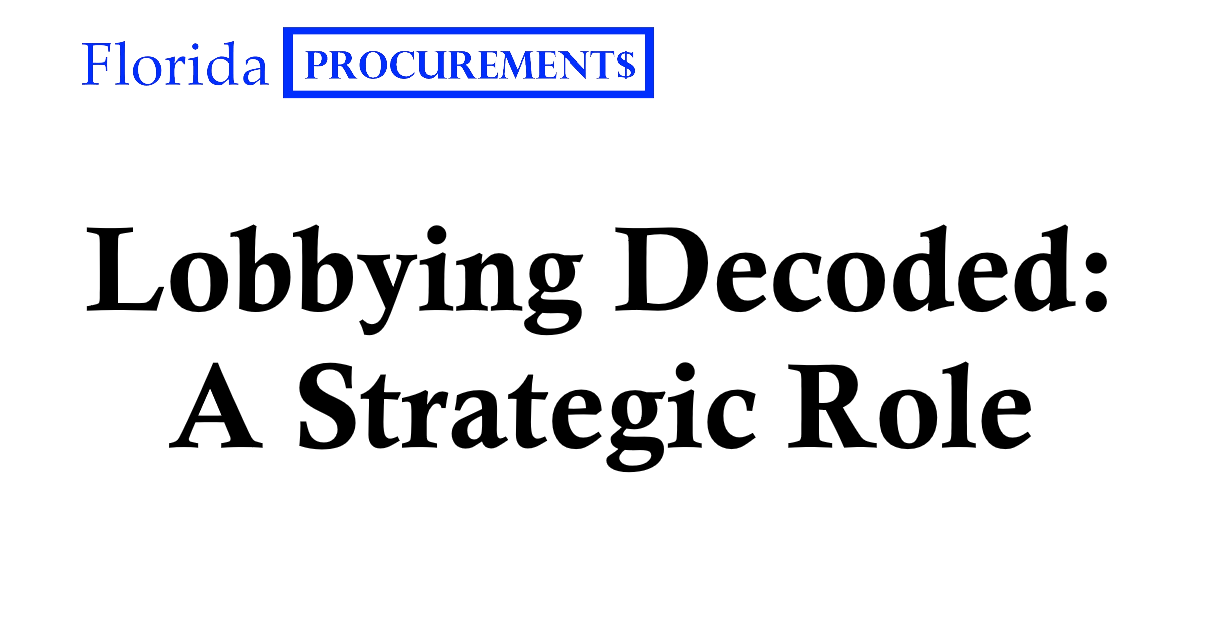
- March 2, 2025
- Sean Gellis
- 0
Welcome to FloridaProcurements.com (FlaProc), your authoritative resource for navigating Florida’s government contracting landscape, with particular focus on transportation and technology opportunities. FlaProc provides free, expert guidance to help companies identify and secure state contracting opportunities throughout Florida.
This resource is maintained by Attorney Sean Gellis of Gellis Law, PLLC, one of less than 75 attorneys Board Certified in State and Federal Government and Administrative Practice by The Florida Bar. Mr. Gellis brings unique insight to government contracting, having served as the Chief of Staff of the Florida Department of Management Services (DMS), General Counsel of the Florida Department of Transportation (FDOT), and Deputy General Counsel of the Florida Office of Insurance Regulation – positions that provided direct oversight of technology initiatives and issues of statewide importance. His record in bid protest litigation reflects the sophisticated advocacy and strategic thinking he brings to government contracting matters, particularly in complex transportation and technology procurements. Sean also leads Procurement Insider, a confidential subscription service that provides technology vendors with strategic intelligence and insider analysis of Florida government opportunities. Learn more about transforming your approach to government contracting at www.gellislaw.com/procurement-insider
Florida’s Office Software Monopoly May Be Ending: Inside DMS’s New “Productivity Tools” Procurement
As someone who’s led major technology initiatives within Florida government, I’ve watched Microsoft’s dominance of state agency software for decades. Every employee, from the highest department head to the newest hire, has lived in a world of Outlook emails, Word documents, and Excel spreadsheets. The Microsoft ecosystem has become so embedded in government operations that many employees can’t imagine working any other way.
But a groundbreaking new procurement released last month signals this Microsoft monopoly might finally be coming to an end.
The Quiet Revolution in State Term Contracting
On February 25, 2025, the Department of Management Services quietly released a solicitation that could fundamentally transform how Florida’s state government operates. The “Productivity Tools” Request for Proposals (RFP No. 25-43231513-RFP) opened in preview mode on the Vendor Information Portal, and though it might sound mundane, it represents a major shift in Florida’s approach to office technology.
What makes this procurement revolutionary isn’t just what it’s buying – it’s how DMS structured it. The RFP explicitly states that “the Department intends to make multiple awards,” opening the door to something government employees haven’t experienced in decades: choice in their workplace software tools.
This departure from Florida’s longstanding single-vendor approach to office productivity software isn’t merely a technical procurement detail. It represents a philosophical shift in how the state approaches workplace technology, moving from standardization to diversification. Many government technology leaders have long advocated for this change, arguing that competition drives innovation and potentially reduces costs.
Breaking Down the Four Service Categories: Microsoft’s Current Dominance at Risk
Reading between the lines of this solicitation reveals just how directly it targets Microsoft’s current dominance. Let’s look at the four service categories DMS identified and their direct correlation to Microsoft’s current offerings:
Service Category 1: Collaboration and Communication Services
This category covers “messaging, virtual meetings, and collaborative workspaces” – in other words, everything currently provided by Microsoft Teams, Outlook, and SharePoint. This opens the door for alternatives like Google Workspace, Slack, or Zoom to finally compete for state agency business.
In practical terms, this could mean Florida’s 150,000+ state employees might soon conduct virtual meetings on Zoom instead of Teams, or collaborate on projects through Slack instead of Outlook. For agencies that have spent years building processes around Microsoft’s communication tools, this represents a significant potential disruption.
Service Category 2: Office Productivity and Document Management
Here’s where the Microsoft Office suite faces its most direct challenge. This category covers “content creation and document management,” the bread and butter of Word, Excel, and PowerPoint. Google Docs, Sheets and Slides are the obvious alternatives, though other vendors like Zoho or LibreOffice could potentially enter the mix.
Consider the implications: Decades of state reports, templates, and procedural documents have been built in Microsoft Word formats. Complex financial models and data analysis rely on Excel’s specific functionality. Presentations to the Legislature and other stakeholders are routinely developed in PowerPoint. A shift to alternative platforms would require rethinking these fundamental workplace processes.
Service Category 3: Cloud Services and Storage
Currently dominated by Microsoft’s OneDrive and SharePoint, this category opens possibilities for Google Drive, Dropbox, Box, or even Amazon Web Services to provide “cloud-based tools that will facilitate secure storage, backup, and collaboration among users.”
The technical implications here are substantial. State agencies have increasingly moved sensitive data to Microsoft’s cloud platforms, often with complex security configurations and integration with other systems. Migrating to new cloud environments isn’t just about moving files – it involves rethinking entire data governance strategies.
Service Category 4: Workflow Automation and Task Management
This final category targets Microsoft Power Automate, Planner, and To Do with alternatives like Asana, Monday.com, or Google’s workflow tools.
Many state agencies have only recently begun leveraging Microsoft’s automation capabilities, building workflows that streamline repetitive tasks and connect disparate systems. These efficiency gains could be at risk if agencies need to rebuild automation in new platforms.
The Executive Preference Problem: A Hidden Risk
While the RFP doesn’t acknowledge it, anyone who’s worked in government knows the reality: technology decisions are often influenced by executive preferences rather than purely technical considerations. I’ve witnessed firsthand how a new agency head or division director can upend established technology ecosystems based on their personal software preferences.
This procurement potentially amplifies this risk. An agency head who prefers Google’s interface might shift an entire department away from Microsoft, only to be replaced two years later by someone who favors Microsoft’s approach. When technology decisions follow leadership changes rather than strategic planning, employees bear the brunt of the disruption.
Consider a realistic scenario: The Department of Environmental Protection standardizes on Google Workspace under one administration, while the Department of Health remains on Microsoft Office. When the Legislature0 requests uniform reporting templates, staff must now create dual versions or struggle with conversion issues. The executive who made the decision experiences this as a minor inconvenience; frontline staff deal with it as a daily frustration.
The Multi-Vendor Future: Innovation vs. Chaos
While this move toward multiple vendors promises advantages – increased competition, potential cost savings, and access to best-of-breed solutions – it also raises significant concerns that shouldn’t be underestimated.
Imagine a scenario where the Department of Environmental Protection standardizes on Google Workspace while the Department of Health remains on Microsoft Office. What happens when:
- Employees transfer between agencies and need to learn entirely new systems
- Cross-agency collaboration requires dealing with incompatible file formats
- Training resources must cover multiple platforms
- IT support teams need expertise across multiple ecosystems
- Security standards must be maintained across divergent platforms
- Legislative oversight requires standardized reporting from non-standardized systems
During my time in state government, I witnessed firsthand how even minor technology changes could trigger significant operational disruptions. A wholesale shift to multiple productivity platforms could create substantial friction in an environment already challenged by limited resources.
The “standardization tax” – the hidden cost of maintaining compatibility between different systems – often outweighs the procurement savings of choosing the lowest-cost vendor. This doesn’t mean standardization is always the right approach, but the full cost of diversity needs honest accounting.
The Hidden Implementation Costs
The RFP is silent on perhaps the most expensive aspect of this potential transition: the human cost of change management. When organizations switch productivity platforms, they typically experience:
- Temporary productivity declines: Employees work more slowly as they learn new systems
- Training costs: Both formal training programs and informal learning time
- Data migration challenges: Moving from one platform to another is rarely seamless
- Integration rebuilding: Custom connections between systems often need redevelopment
- Shadow IT risks: Frustrated employees may resort to unsanctioned tools
- Institutional knowledge fragmentation: Information becomes scattered across platforms
For a government workforce that spans multiple generations and varying levels of technical adaptability, these costs can be substantial. I’ve seen migrations that looked cost-effective on paper become budget nightmares when implementation realities set in.
The Politics Behind the Procurement
This shift didn’t happen in a vacuum. Several factors likely influenced DMS’s decision to open this market:
- Cost Pressures: Microsoft enterprise agreements aren’t cheap, and alternative providers have increasingly competitive offerings.
- Technology Evolution: Cloud-based productivity tools have matured significantly, making alternatives more viable than ever before.
- Vendor Lobbying: Non-Microsoft vendors have likely been pushing for this opening for years.
- Political Considerations: Technology procurement decisions increasingly carry political dimensions beyond mere functionality.
- Federal Trends: The federal government has increasingly embraced multi-vendor environments.
The timing is particularly interesting. With a legislative session underway and budget negotiations in full swing, this procurement signals potential shifts in how Florida approaches technology spending. Is this part of a broader strategy to reduce long-term technology costs, or primarily an effort to introduce more vendor competition?
What Happens Next?
The procurement timeline indicates proposals are due April 8, with an anticipated award date of June 3, 2025. That means new contracts could be in place by mid-summer, potentially allowing agencies to begin transitions as early as the new fiscal year.
For vendors, this represents a once-in-a-generation opportunity to break into Florida’s massive government market. For state agencies, it creates both opportunities and challenges as they evaluate whether to stick with the familiar Microsoft ecosystem or explore alternatives.
For the 150,000+ state employees who use these tools daily, significant change may be on the horizon, whether they’re ready for it or not. And based on my experience leading major technology transitions, most won’t be ready – not because state employees resist change, but because change without adequate preparation and resources rarely succeeds.
The Broader Implications
This procurement reflects a national trend of governments questioning long-standing technology monopolies. From cloud services to productivity tools, public sector organizations are increasingly pushing for more vendor choice and flexibility.
Yet the execution will determine whether this shift leads to innovation or disruption. Key questions remain:
- Will DMS provide guidance on which agencies should use which tools?
- How will cross-agency collaboration be handled when using different platforms?
- What migration support will be available for agencies that switch platforms?
- How will training be managed for employees unfamiliar with new systems?
- Will security standards be consistently applied across different platforms?
- How will the state address accessibility requirements across multiple vendors?
A Balancing Act: Standardization vs. Competition
The ideal approach likely lies somewhere between complete standardization and unchecked diversity. Some potential middle paths include:
- Core vs. Specialized: Standardize core communication tools while allowing diversity in specialized applications
- Mandated Interoperability: Require all vendors to support open standards for document exchange
- Coordinated Procurement: Allow choice while providing central coordination of implementations
- Staged Transitions: Pilot new approaches in specific agencies before broader adoption
As Florida navigates this transition, the Department of Management Services will need to balance the benefits of competition with the very real costs of complexity. This isn’t just a procurement decision – it’s a fundamental shift in how state government approaches its most basic technology tools.
Looking Ahead
As Florida navigates this transition, the experience will likely influence other states considering similar moves. The success or failure of this procurement could shape government technology purchasing nationwide for years to come.
For companies doing business with Florida government, preparation is essential. Whether agencies stick with Microsoft or pivot to alternatives, understanding the changing landscape will be crucial for effective engagement with state partners.
One thing is certain: the days of assuming every Florida agency runs on Microsoft are coming to an end. How smoothly this transition unfolds remains to be seen.
Need strategic guidance on navigating Florida’s evolving technology landscape? Contact Gellis Law, PLLC for sophisticated counsel informed by direct experience with Florida’s technology procurement systems.








